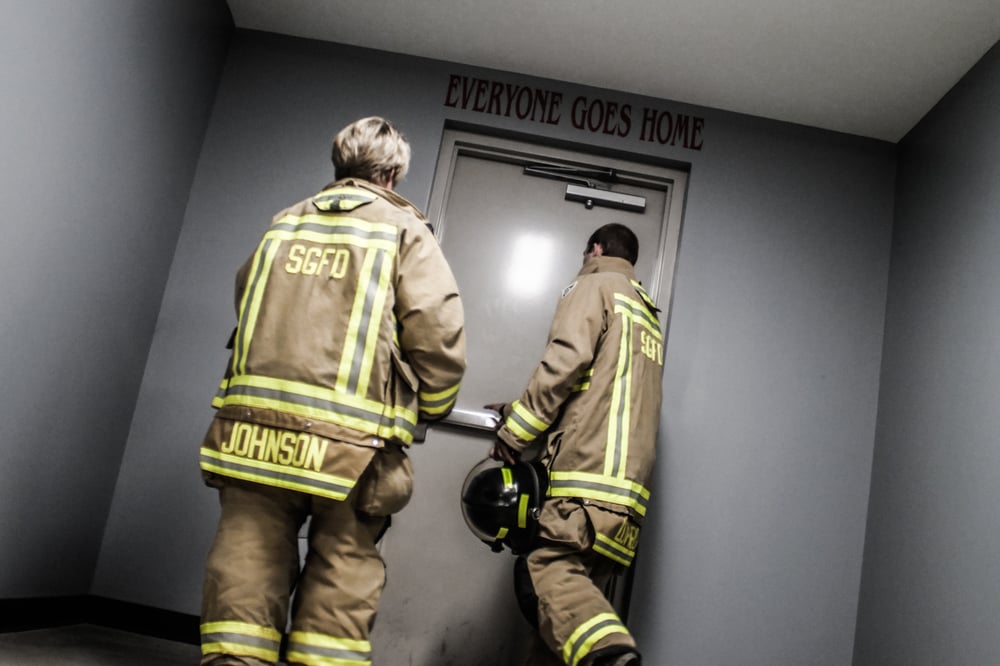The stigma of mental health services prevents some firefighters from seeking the help they need – it’s time to put pride aside and embrace an open dialogue.
This article first appeared in International Fire Fighter.
Mental health is a serious issue for many professions, but those in the fire service are especially vulnerable due to the high levels of stress and trauma they encounter in the line of duty. It is essential that all firefighters learn how to recognize their own mental-health status and take steps to address any issues. Unfortunately, these issues remain highly stigmatized, and it can be difficult for individuals to find the help they need.
At Fire-Dex, we engineer top-quality protective gear for emergency responders and, in doing so, have become keenly aware of the mental-health challenges facing firefighters. Beyond critical PPE, we strive to provide departments with valuable support, training and resources for fire-service professionals.
Following are some observations stemming from our company’s close work with fire departments for years. At the same time, we hope to share some helpful strategies for addressing mental health issues.
1. Support is key. PTSD is real and finding support and guidance through the entire career journey, from training to retirement, is important.
Post-traumatic stress disorder (PTSD) is among the most significant mental-health issues facing fire service professionals. Firefighters are exposed to traumatic events on a regular basis, and this can lead to symptoms of PTSD such as flashbacks and difficulty sleeping.
Recent studies have shown that the prevalence of PTSD in firefighters is on the rise. While there have been no definitive estimates, different studies have produced figures ranging anywhere from 15% to 38%. The intensity and duration of incidents they are exposed to, the number of fatalities they are confronted with, as well as the feeling of helplessness that comes with not being able to save every life are all factors that can contribute to the development of PTSD in firefighters.
The first step is to recognize the signs. Commonly, these include withdrawal from social activities or changes in sleeping and eating patterns, or in mood and behavior. If a firefighter should notice any of these symptoms in themselves or a colleague, it is important to reach out for help.
One way that departments are addressing the issue is by increasing psychological support services including access to mental health counsellors and group or individual therapy sessions, as well as providing educational sessions on the symptoms of PTSD. At the same time, more departments are developing screening tools that can identify firefighters at risk of PTSD at an early stage.
There is also greater investment in preventive measures such as increasing awareness of mental-health topics and providing training on methods for stress management.
Importantly, firefighters can benefit from support and guidance throughout their entire career journey and not just when problems surface. Many departments have launched peer support programs operated by seasoned firefighters or an association of firefighters, where an individual can discuss the troubling events they have been exposed to. Having someone to talk to who understands the physical and emotional stresses of the job can be a powerful remedy to shutting down and locking others out.
Emergency responders often remark how helpful it is to have a trusted person to bring them back to reality and understand what’s happening. The simple act of giving somebody one’s time and attention cannot be understated. After all, the fire-service industry is built on people helping people in need, and as an industry we must strive to turn that benevolent spirt inward and focus on those who might be struggling.

2. It is important to understand the biggest misconception about firefighter mental health: suicide among firefighters is not simply about the job but more about knowing how to address emotional health.
It’s well known that the grueling physical demands of firefighting can be emotionally and mentally draining, leading to feelings of exhaustion, frustration and even helplessness. Less talked about are how the psychological ‘costs’ associated with being a firefighter can be exacerbated by the high expectations placed upon them by their peers, superiors and even their families. Given these factors, it is clear that suicide among firefighters is a complex problem that necessitates a multifaceted approach to prevention and treatment.
When dealing with depression or overwhelming stress, firefighters will often choose not to address it because they regard the issue as being ‘insignificant’ compared to other problems of the world.
‘This isn’t a real problem…’
‘You don’t need to burden anybody with it…’
‘Keep it to yourself…’
These are thoughts that many firefighters have. Among firefighters that have died by suicide, research shows that job stresses are not the obvious culprit in many cases. Often, our inability to ask for help when we need it most contributes significantly to deteriorating mental health.
Counsellors and psychiatrists can provide a safe space for individuals to talk openly about their thoughts and feelings. Counselling can also help fire-service professionals understand and manage their emotions in a constructive way and to learn from their colleagues who are going through similar experiences. This can create a sense of solidarity and support that can help reduce feelings of isolation and hopelessness among firefighters.
3. Reducing the stigma starts by giving ourselves – and others – grace.
Encouraging open dialogue and productive conversations about mental health may be uncomfortable at first, but it can help to reduce the stigma for firefighters.
It is important for departments to create an accepting environment for those seeking mental-health services. This begins with changing the language used when talking about mental illness and seeking help. Instead of using negative words such as ‘weak’ or ‘crazy’, we should strive to encourage people to talk about others’ feelings in a non-judgmental way.
Another way to reduce the stigma is through robust mental-health policies. Clear procedures should be in place to protect the confidentiality of any firefighter that uses mental-health services and to ensure there are no negative consequences for those choosing to seek help. Furthermore, leaders must set an example of normalizing conversations around mental health by promoting an open dialogue.
Of course, mental-health services must be adequately funded so that firefighters of any income level can access the care they may need. This means allocating a sufficient budget to education and support resources, as well as creating and maintaining a positive culture that encourages the use of these services.
4. Equip yourself with the right tools and skills (and don’t be intimidated). From forming a peer group to journaling to practicing mindfulness exercises, prime for the journey ahead.
Some people talk about it. Other people journal. The truth is that authentic, meaningful connections can be made in person or on paper when there is no fear of showing emotion or saying the wrong thing.
Studies conducted on college campuses, in prisons and in rest homes, for instance, have found that journaling about negative events is an incredible way to process them. It’s easy to be intimidated by the thought, or to think that one must write a lot in order to benefit; however, the simple act of repeating even one line over and over – of getting the thought out and writing it down – can be therapeutic.
We all know – or we need to all know – that mindfulness could be one of our greatest superpowers. It’s free, and anybody can do it. Without a practice of mindfulness, it’s easy to get stuck in negative habit loops.
It’s also easy to forget to express gratitude. A daily practice of gratitude can make a big difference, where instead of waking up and moving quickly, one stays in bed to reflect and ask, what am I grateful for today?
No matter how bad yesterday was, choose to start today by acknowledging three things you are grateful for. You may find that when negative things happen, things we can’t explain, the practice of gratitude helps remind us that it’s not all dim – there is always something to be grateful for. What’s most important is to train ourselves to choose our response to any stimulus we can’t control in a positive way.
It can also be helpful to explore alternative strategies for managing job stress such as mindfulness, yoga, exercise and regular physical activity. Additionally, there are many organizations that provide free support to assist firefighters as they navigate their career path. Organizations such as the Firefighter’s Support Alliance and the International Association of Fire Fighters through its Behavioral Health Program provide educational programs and training sessions which can help fire-service professionals identify their problem areas and equip them with the skills to manage stress and anxiety.

Keep talking …
Poor mental health is a serious issue for fire-service professionals, and it is essential that they take steps to recognize and address it. With proper support, individuals can learn how to manage their feelings and maintain good mental health. Firefighters should also make sure they are taking care of their physical health and develop a support system of both professional counsellors and colleagues.
Together, we can break the mental-health stigma so that firefighters can be at their best when serving an essential role in their communities.



.png)


Leave a Reply